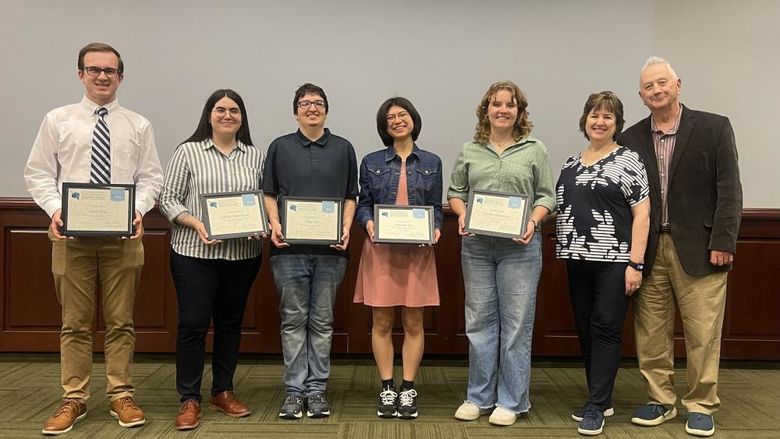
UNIVERSITY PARK, Pa. — Each year, Penn State’s Edna Bennett Pierce Prevention Research Center (PRC) grants awards of up to $2,500 to fund projects by early career researchers whose work promotes the health of members of historically marginalized groups in the U.S. or abroad.
At noon on April 25, the six recipients of this year’s awards will present updates on their funded projects in Room 312 of the Biobehavioral Building and via Zoom (no registration required). Participants will learn about the researchers’ work in promoting the health and well-being of historically underrepresented populations and have the opportunity to ask questions. Their PRC-funded projects are described below.
"Their work will have impacts in so many important domains.”—Greg Fosco , PRC associate director and professor of human development and family studies
Jilli Jung — 'The role of gender identity policies in the behavioral health of gender minorities'
“Gender minorities are at higher risk for poor behavioral health compared to cisgender people. For example, around 40% of gender minorities have attempted suicide,” said Jilli Jung, doctoral student in education policy studies. “However, when gender minorities receive gender-affirming support at home, school and work, behavioral health disparities become smaller.”
Jung is researching whether and how gender marker policies — such as bans on changing gender designation on identification cards — influence the behavioral health of gender minority youth and adults. She said she hopes her research will raise awareness about the negative health impacts that anti-gender-minority policies can cause. Her adviser for this project is Soo-yong Byun, Penn State professor of education.
Nigel James — 'Examining the effect of non-contributory social pension programs on depression among elderly adults in Mexico'
“Despite a growing focus on global mental health, geriatric mental health remains a neglected area, especially in low- and middle-income countries,” said Nigel James, doctoral candidate in health policy and administration.
James will use data from the Mexico Health and Retirement Survey to examine the impact of non-contributory social pension programs on depression among the elderly.
“My research spotlights the complex nexus of poverty, depression and health care access, exploring how innovative health financing can be leveraged to develop and scale up viable geriatric mental health policy solutions,” said James.
James’ adviser is Yubraj Acharya, Penn State assistant professor of health policy and administration.
Nicole Ryerson and Jessica Saalfield — 'The impact of geography and campus size: A community-based investigation of alcohol culture on small, rural campuses'
Students at small, rural college campuses may be at heightened risk of alcohol misuse due to the unique stressors they experience. These include geographic isolation, lack of a large social community, and the need to maintain work and family obligations, according to Jessica Saalfield, assistant professor of psychology at Penn State Schuylkill; and Nicole Ryerson, assistant professor of psychology at Penn State Lehigh Valley.
Current alcohol-misuse prevention programs may not apply to students outside of the “typical” college stereotype because most alcohol research is being conducted at large universities with infrastructure and resources for their students, said Ryerson and Saafield.
The researchers will conduct semi-structured interviews across the 19 Penn State Commonwealth Campuses with the aim of developing a culturally sensitive, supplemental-alcohol-use survey. Ultimately, their goal is to aid in developing improved prevention and intervention techniques aimed at these communities.
Supriya Joshi — 'Violence and women’s health: A case of Dalit women forced to practice chhaupadi'
“I was born and raised in Far West Nepal and have seen devastating effects of direct and structural forms of violence on women’s lives,” said Supriya Joshi, doctoral student in rural sociology. “I am also inspired by the women’s resilience and creative ways of leading their lives with dignity and strength in the face of adversity."
Using the grant from PRC, Joshi will document the experiences of Dalit women in western Nepal who are forced to practice chhaupadi, a cultural practice in which women are forced to stay in makeshift huts or cowsheds during menstruation and childbirth. "The caste system makes Dalit women vulnerable to different types of violence.” Joshi said. She is also exploring the discourses, meanings and underlying assumptions of international media on their coverage of chhaupadi.
With this work, Joshi hopes to address structural racism and casteism and contribute to the knowledge needed for structural change. Her adviser is Kathleen Sexsmith, assistant professor of rural sociology at Penn State.
Katja Waldron — 'Ethnicity-specific risk and protective factors for coping-motivated alcohol use and consequences'
“When I started working in an alcohol research lab, I was amazed at how effective behavioral drinking interventions were at reducing harm associated with alcohol use among college students,” said Katja Waldron, doctoral candidate in biobehavioral heath. “However, as I became more familiar with the research, I noticed that studies often lacked racial and ethnic diversity within their samples. These numbers were concerning to me because it meant that current drinking interventions were not developed with students of color in mind.”
Waldron will conduct focus groups with Latino college students about their experiences with attending a predominantly white institution; stress; coping; and drinking. Her goal is to use research that accounts for the experiences of students of color to develop and inform culturally relevant drinking interventions. Her adviser is Rob Turrisi, Penn State professor of biobehavioral health.
Greg Fosco, PRC associate director and professor of human development and family studies, said the PRC is proud to support these scholars, noting that “their work will have impacts in so many important domains.”





